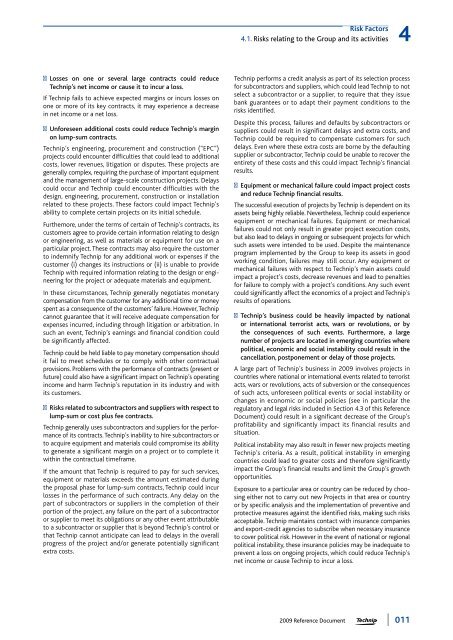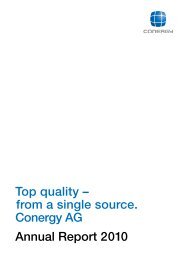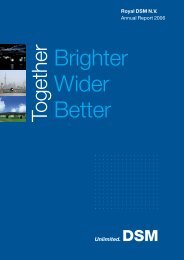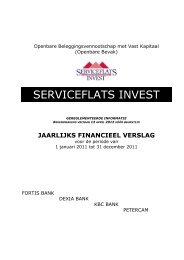Reference Document
Reference Document
Reference Document
You also want an ePaper? Increase the reach of your titles
YUMPU automatically turns print PDFs into web optimized ePapers that Google loves.
Risk Factors<br />
4.1. Risks relating to the Group and its activities 4<br />
Losses on one or several large contracts could reduce<br />
Technip’s net income or cause it to incur a loss.<br />
If Technip fails to achieve expected margins or incurs losses on<br />
one or more of its key contracts, it may experience a decrease<br />
in net income or a net loss.<br />
Unforeseen additional costs could reduce Technip’s margin<br />
on lump-sum contracts.<br />
Technip’s engineering, procurement and construction (“EPC”)<br />
projects could encounter difficulties that could lead to additional<br />
costs, lower revenues, litigation or disputes. These projects are<br />
generally complex, requiring the purchase of important equipment<br />
and the management of large-scale construction projects. Delays<br />
could occur and Technip could encounter difficulties with the<br />
design, engineering, procurement, construction or installation<br />
related to these projects. These factors could impact Technip’s<br />
ability to complete certain projects on its initial schedule.<br />
Furthemore, under the terms of certain of Technip’s contracts, its<br />
customers agree to provide certain information relating to design<br />
or engineering, as well as materials or equipment for use on a<br />
particular project. These contracts may also require the customer<br />
to indemnify Technip for any additional work or expenses if the<br />
customer (i) changes its instructions or (ii) is unable to provide<br />
Technip with required information relating to the design or engineering<br />
for the project or adequate materials and equipment.<br />
In these circumstances, Technip generally negotiates monetary<br />
compensation from the customer for any additional time or money<br />
spent as a consequence of the customers’ failure. However, Technip<br />
cannot guarantee that it will receive adequate compensation for<br />
expenses incurred, including through litigation or arbitration. In<br />
such an event, Technip’s earnings and financial condition could<br />
be significantly affected.<br />
Technip could be held liable to pay monetary compensation should<br />
it fail to meet schedules or to comply with other contractual<br />
provisions. Problems with the performance of contracts (present or<br />
future) could also have a significant impact on Technip’s operating<br />
income and harm Technip’s reputation in its industry and with<br />
its customers.<br />
Risks related to subcontractors and suppliers with respect to<br />
lump-sum or cost plus fee contracts.<br />
Technip generally uses subcontractors and suppliers for the performance<br />
of its contracts. Technip’s inability to hire subcontractors or<br />
to acquire equipment and materials could compromise its ability<br />
to generate a significant margin on a project or to complete it<br />
within the contractual timeframe.<br />
If the amount that Technip is required to pay for such services,<br />
equipment or materials exceeds the amount estimated during<br />
the proposal phase for lump-sum contracts, Technip could incur<br />
losses in the performance of such contracts. Any delay on the<br />
part of subcontractors or suppliers in the completion of their<br />
portion of the project, any failure on the part of a subcontractor<br />
or supplier to meet its obligations or any other event attributable<br />
to a subcontractor or supplier that is beyond Technip’s control or<br />
that Technip cannot anticipate can lead to delays in the overall<br />
progress of the project and/or generate potentially significant<br />
extra costs.<br />
Technip performs a credit analysis as part of its selection process<br />
for subcontractors and suppliers, which could lead Technip to not<br />
select a subcontractor or a supplier, to require that they issue<br />
bank guarantees or to adapt their payment conditions to the<br />
risks identified.<br />
Despite this process, failures and defaults by subcontractors or<br />
suppliers could result in significant delays and extra costs, and<br />
Technip could be required to compensate customers for such<br />
delays. Even where these extra costs are borne by the defaulting<br />
supplier or subcontractor, Technip could be unable to recover the<br />
entirety of these costs and this could impact Technip’s financial<br />
results.<br />
Equipment or mechanical failure could impact project costs<br />
and reduce Technip financial results.<br />
The successful execution of projects by Technip is dependent on its<br />
assets being highly reliable. Nevertheless, Technip could experience<br />
equipment or mechanical failures. Equipment or mechanical<br />
failures could not only result in greater project execution costs,<br />
but also lead to delays in ongoing or subsequent projects for which<br />
such assets were intended to be used. Despite the maintenance<br />
program implemented by the Group to keep its assets in good<br />
working condition, failures may still occur. Any equipment or<br />
mechanical failures with respect to Technip’s main assets could<br />
impact a project’s costs, decrease revenues and lead to penalties<br />
for failure to comply with a project’s conditions. Any such event<br />
could significantly affect the economics of a project and Technip’s<br />
results of operations.<br />
Technip’s business could be heavily impacted by national<br />
or international terrorist acts, wars or revolutions, or by<br />
the consequences of such events. Furthermore, a large<br />
number of projects are located in emerging countries where<br />
political, economic and social instability could result in the<br />
cancellation, postponement or delay of those projects.<br />
A large part of Technip’s business in 2009 involves projects in<br />
countries where national or international events related to terrorist<br />
acts, wars or revolutions, acts of subversion or the consequences<br />
of such acts, unforeseen political events or social instability or<br />
changes in economic or social policies (see in particular the<br />
regulatory and legal risks included in Section 4.3 of this <strong>Reference</strong><br />
<strong>Document</strong>) could result in a significant decrease of the Group’s<br />
profi tability and signifi cantly impact its fi nancial results and<br />
situation.<br />
Political instability may also result in fewer new projects meeting<br />
Technip’s criteria. As a result, political instability in emerging<br />
countries could lead to greater costs and therefore significantly<br />
impact the Group’s financial results and limit the Group’s growth<br />
opportunities.<br />
Exposure to a particular area or country can be reduced by choosing<br />
either not to carry out new Projects in that area or country<br />
or by specific analysis and the implementation of preventive and<br />
protective measures against the identified risks, making such risks<br />
acceptable. Technip maintains contact with insurance companies<br />
and export-credit agencies to subscribe when necessary insurance<br />
to cover political risk. However in the event of national or regional<br />
political instability, these insurance policies may be inadequate to<br />
prevent a loss on ongoing projects, which could reduce Technip’s<br />
net income or cause Technip to incur a loss.<br />
2009 <strong>Reference</strong> <strong>Document</strong><br />
011

















